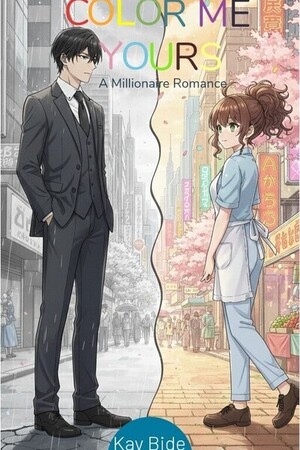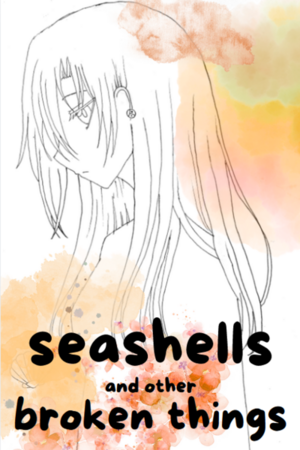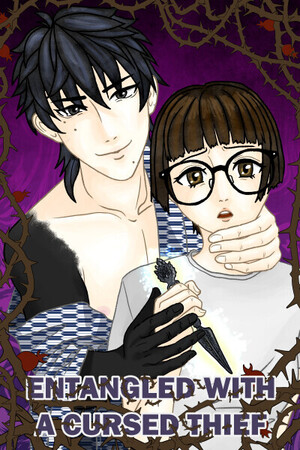Chapter 1:
Chapter 1: A Complicated Human Emotion
Color Me Yours
POV: Kaito Minami
“According to psychology,” the man on the television said, his voice smooth and deliberate, “love is often defined as an enigmatic force that shapes our lives. An emotional connection between two beings who feel affection for one another. A complicated human emotion, they say.”
The audience laughed softly, charmed by his warmth, lulled by his precision.
I didn’t.
Yumihiro Minami—chairman, philanthropist, and the nation’s beloved moral compass—sat beneath the studio lights as though the entire world tilted to orbit around him.
He looked every inch the man Japan adored: dark hair swept back with meticulous care, silver beginning to thread at the temples just enough to suggest wisdom rather than age. His jaw was clean-shaven, sharp, elegant, the kind of symmetry magazines fawned over. His charcoal suit hugged him with surgical tailoring, the pocket square folded with geometric perfection. Even his posture exuded authority—back straight, shoulders set at a precise angle that conveyed accessibility without sacrificing dominance. His eyes, a polished onyx, reflected the studio lights with a calm, authoritative glow that suggested depth he did not possess.
Perfect suit. Perfect smile. Each gesture refined to the point of artifice.
A man carved from influence, performing humanity the way a virtuoso performs a concerto: flawlessly, but without soul.
I watched him from my penthouse, perched on the edge of a sofa I didn’t remember selecting, in a home I’d inherited rather than earned. Same last name. Same eyes. Same cold, polished veneer.
“He sounds wise, doesn’t he?” a voice said behind me.
I turned slowly, careful not to spill the coffee in my hand.
Sato stood in the doorway—my assistant, my shadow. Tall, composed, with long blond hair pulled into a low ponytail that fell over one shoulder. His thin-rimmed glasses reflected the muted light of the room, momentarily hiding his green eyes before they sharpened on me again. His expression hovered somewhere between concern and neutrality, his breathing measured as though afraid to disturb the fragile equilibrium of my mornings.
He held a tablet against his chest, fingers pressed a little too tightly along its edges.
“Your father’s interview is trending again,” he said quietly. “They’re calling it ‘The Philosophy of Love by Yumihiro Minami.’”
“Of course they are,” I murmured, setting the cup down. The ceramic struck marble, the ‘dink’ sound too sharp for the morning calm.
He hesitated, as though weighing the value of his next words. “You really don’t agree with him, do you, Kaito?”
I looked back at the screen. My father spoke about love like a businessman unveiling a strategy—each word an investment, each pause deliberate. He didn’t feel things. He performed them.
“No,” I said finally. “I don’t pretend to understand what I don’t believe in.”
Outside, Tokyo glittered beneath the pale daylight—though to me, it wasn’t gold or blue or rose. Just gradients of gray. Towers of steel washed in silver, asphalt veins pulsing with black and white.
I hadn’t seen color in years. Whether it was psychological or punishment, I no longer cared. Perhaps my mind had decided to protect itself from beauty it couldn’t feel anymore.
My reflection merged with my father’s image on-screen—two silhouettes sharing the same face, the same bone-deep hollowness. One admired by millions. The other watched from silence.
Sato didn’t move. He understood that some silences were meant to be left untouched. The only sound came from the television—the faint hum of applause, my father’s perfectly timed laughter. Even that seemed rehearsed.
“Do you ever think,” Sato said at last, “that maybe he believes it? What he says about love, I mean.”
I laughed once, low and tired. “He believes in the illusion of belief. It’s safer that way.”
Sato said nothing. In this world, understanding wasn’t measured by agreement, but endurance.
The interview faded into a commercial—another Minami Group initiative: schools in rural prefectures, a parade of smiles filmed in perfect lighting. The script of benevolence was flawless.
I switched the TV off. Silence fell again, heavier this time, pressing against the walls.
“You have a meeting in twenty minutes,” Sato reminded. “The investors from Kyoto are waiting.”
“I know.”
He lingered—anxious loyalty disguised as duty. “You should change.”
I looked down at myself: half-buttoned shirt, sleeves rolled, a dried espresso stain darkening the cuff. The tie I’d abandoned earlier hung from the sofa like a defeated soldier. In the reflection of the window, I saw myself in grayscale—a man shaped by precision, yet emptied by inheritance.
“You’re right,” I said. But I didn’t move.
Sato bowed lightly, excusing himself. The door clicked shut.
I stood at the window. The city pulsed beneath me, alive in motion but dead in tone.
People loved to call Tokyo the city of light. To me, it was a machine made of shadows—metal, noise, and unspoken desire.
My father’s smile lingered in my mind, etched like a scar.
Love, he called it. The great enigma.
‘A force that shapes lives’. I wondered whose life he had ever shaped besides his own.
I poured another cup of coffee, black and burning. Steam curled upward like a fading soul. My gaze followed it, tracing its brief freedom before it vanished. Beautiful, because it didn’t last. Unlike him.
My phone buzzed. I didn’t need to look to know who it was.
Mother.
I let it ring once. Twice. On the third, I answered.
“Kaito,” she said, her voice soft but clinical—like someone diagnosing emotion rather than expressing it. “You saw the interview?”
“I did.”
“He spoke well.”
“He always does.”
A pause. Then, that faint sigh I’d grown up with—measured disappointment dressed as restraint. “You shouldn’t sound so bitter. It doesn’t suit you.”
“And what does?” I asked, my tone dry, detached. “Admiration?”
“I’d settle for understanding,” she replied. “He built everything for you, you know.”
I looked around the apartment—steel, glass, marble. A place designed to impress others, not to live in. “He built it for himself. I just exist inside it. Like furniture with opinions.”
Her silence tightened, thin and sharp.
Then: “You’re more like him than you think.”
That was when I ended the call.
The coffee had cooled. I set it aside and pressed my hand to the window. Below, the city churned—gray, infinite, alive yet soulless.
People often mistook light for warmth, but I had learned that light only exposed the places that were already empty.
I walked to the bedroom—another cathedral of sterile design. White sheets, gray walls, a bed that had never known a lover’s warmth. Everything symmetrical, lifeless, perfect.
I opened the closet. Rows of suits and shirts hung in careful gradients: white to charcoal gray to black. The monotony comforted me. Predictability was safer than passion. Even my clothes had surrendered to the absence of color.
As I dressed, the movements felt automatic—fabric sliding over skin, the crisp bite of pressed cotton, the faint scent of detergent. The tie tightened like a noose around the throat of whatever softness remained in me.
When I looked in the mirror, the man staring back was both familiar and foreign. My father’s son in everything but conviction. Eyes dark and reflective, like glass before it shatters.
A man who could define love but had never felt it.
Sato waited by the door when I emerged.
“The car is ready,” he said softly. “The Kyoto investors have all confirmed attendance.”
“Of course they have. A Minami presentation is basically theater—just with worse lighting.”
He hesitated. “Also… your father’s secretary called.”
My chest tightened. He meant my mother.
“She said your father wants to see you. Tonight.”
“Here?”
“No. At the Minami estate.”
The word estate hung in the air, carrying with it a weight of memory I had long since buried. I hadn’t set foot there since the night I was forced away—from him, from her, from the illusion that love could exist inside walls built of ambition.
“Did she say why?”
“Only that it’s important.”
I almost smiled. “Love, legacy, and now importance. He’s hitting all the themes today. Maybe next he’ll release a motivational calendar.”
Sato didn’t respond. He never did when truth began to sound too much like confession.
“Fine,” I sighed. “After the meeting, we’ll go.”
He bowed and left.
I turned once more to the window.
The city moved in monochrome silence, beautiful and cold. Somewhere, the man who shared my blood was teaching the world about love.
And somewhere else, I stood wondering if I’d ever see color again——or if it would take meeting someone unexpected to remind me what it looked like.




Please sign in to leave a comment.